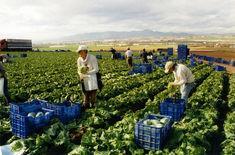
The British way of dealing with suppliers is widely considered as very satisfactory by Spanish growers and exporters, who have long supplied the market with a wide range of lines. The trading structure between Spain and the UK is established by UK-based customers and rests on a strong demand for high-quality produce. The stability of price and volume, coupled with demand for the best quality, are appreciated by Spanish suppliers.
In each case, a seasonal supply calendar is set up between Spanish exporters and UK customers, normally closing the gaps of the British offer, but with no fixed prices set. UK customers tend to have high expectations, so only the best product that meets GlobalGAP specifications, as well as additional standards such as Nature’s Choice, Field to Fork or LEAF, are sent to the UK.
But some major issues have posed obstacles in the last 12 months.
Currency instability is a major issue for the export business, as value fluctuation affects agreed prices directly. With sterling falling against the euro, the situation has stretched Spanish exporters to the limit.
Another question is looming over the present economic crisis. Exporters are warning that if things get out of control, they are not sure that the present level of demand, both in terms of quantity and quality, can be sustained. Fears that if supermarkets feel the pinch, they could transmit the pain to their suppliers, are taking hold.
The third major concern is that the potential surge of discounters in the UK could bring with it a radical change to the present trading model.
But these challenges have not yet hit the reputation that Spain has earned as a key source for the UK market. More worrying perhaps are the consistently poor weather patterns that have affected export potential in the last five years.
Spanish exports to the UK are significant. Taking trade figures on tomatoes from 2006 as an indicator, total exports amounted to roughly one million tonnes, with 208,000t sent to Germany, 176,000t to France, 160,000t to the Netherlands and 180,000t to the UK.
Major salad grower Primaflor farms some 4,000 hectares of different vegetables, most of them lettuces, in northern Almería. The supplier has developed a successful partnership with Sainsbury’s and provides some 75 per cent of iceberg lettuce for the chain, as well as Little Gem and romaine, which is making a comeback in the UK as a speciality offer.
Some 200km south, in a belt of greenhouses surrounding El Ejido, growers’ association Nature Choice, which stands as a different example of a Spanish exporter, has its headquarters. The association has 11 partners - most, but not all, growers - from the area around El Ejido, close to the provincial capital of Almería, and produces 50,000t of fresh produce. It started out back in 2000 with a total of 250ha of greenhouses. Now, the partners own 410ha, with an average of 38.5ha of greenhouses, which compares favourably to the average greenhouse area for each grower in Almería, at 1.5ha.
Half of the sales are direct deals with supermarket chains and seven per cent of exports to the UK are used as raw material for the fresh-cut industry. Items for the fresh market are packed on site and then transported, as packaging product in the UK proved too expensive.
The whole system rests on the stability of prices at retail level, a condition of the UK market, says Manuel Arévalo, sales manager of Nature Choice.
The mood of the Spanish industry, overall, remains optimistic. And if not, says Arevalo, “when it rains, everybody gets wet” and that will be the moment to look, together, for a big umbrella.



